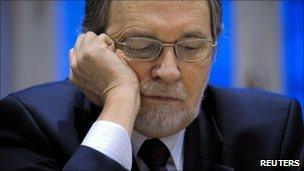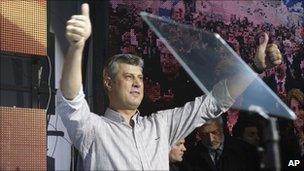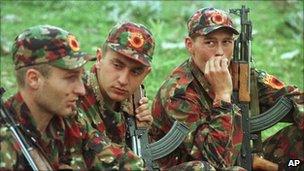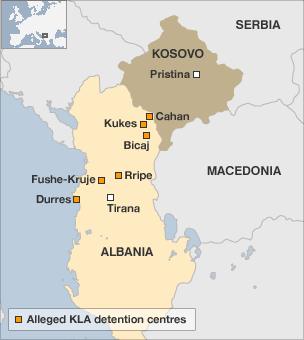Kosovo organ trafficking: Where is the proof?
- Published

Dick Marty appears to have uncovered solid evidence - but who talked to him?
A report accusing Kosovo's political leaders of organ-trafficking has sent shockwaves around Europe and, as the BBC's Central Europe correspondent Nick Thorpe explains, pressure is growing on the author to back up his allegations.
By May this year, Dick Marty's investigation into alleged organ trafficking and other crimes in Kosovo and Albania was getting nowhere, according to well-placed sources in Kosovo, Serbia, and Strasbourg.
The Swiss politician, working for rights group the Council of Europe, had made several trips through the region, but had been frustrated at every turn.
Constant leaks from the War Crimes Prosecutor's office in Belgrade damaged Serbia's own investigations into the allegations, leading some senior figures in Belgrade to despair of ever finding the truth.
The Albanian authorities consistently refused to co-operate with Serbian requests to investigate alleged mass grave sites in Albania.
War-crimes investigators from Eulex (European Union Law and Justice Mission in Kosovo) told Mr Marty that the organ allegations were a gruesome "fairytale".
They said the claims were distracting attention from the real task of finding some 1,861 people still registered as missing from the conflict in the region - two-thirds of them Kosovar Albanians.
'Dozens of sources'
Mr Marty went from door to door, in a convoy of highly visible vehicles. His report was due to be published as early as June, but its prospects seemed as dark as the sunglasses of his bodyguards.

Kosovo PM Hashim Thaci is named 27 times in the highly critical report
Observers expected a political statement urging all governments to do more and predicted little actual progress. Then something happened.
Mr Marty appears to have discovered enough evidence to delay publication until the Swiss senator felt he had gathered enough to proceed.
Paragraph 23 of Mr Marty's draft report, published this week, states: "We have obtained testimonial and documentary accounts from several dozen primary sources, notably including: combatants and affiliates of various armed factions that participated in the hostilities in Kosovo; [and] direct victims of violent crimes committed in Kosovo and the surrounding territories."
Paragraph 44 notes: "According to our insider sources the KLA [Kosovo Liberation Army] fought just as hard, and devoted arguably more of its resources and political capital, to maintain its advantage over its ethnic Albanian rival factions as it did to carry out co-ordinated military actions against the Serbs."
EU link
So who talked to Mr Marty? It is common knowledge among investigative reporters in Serbia that the leads ran out there long ago, and in Kosovo itself a mixture of clan loyalty and intimidation makes investigation very difficult.

Kosovo fighters operated inside Albania during the war
Many pages in the draft report are devoted to an analysis of KLA operations inside Albania. It seems only logical to conclude that Mr Marty's new sources should be found in Albania, probably in intelligence services which once co-operated closely with the KLA.
This would also make sense from a geo-political perspective. As a member of Nato, Albania has had to break down some of the barriers between its own intelligence services, and those of other member countries. As it edges towards eventual European Union membership, it is also urgently seeking allies in Europe.
There are new details in the report of alleged organ-trafficking, this time focused less on the infamous "yellow house" in the village of Rripe in central Albania, which was the subject of an international war-crimes investigation in 2004, but on another facility in Fushe Kruje, just north of Tirana.
Conspiracy theories
Kidneys were allegedly extracted from captives immediately after they were killed there. The report also suggests links to a much more recent case of organ trafficking in Pristina, the trial of which has just begun.
In Pristina, the authorities continue to deny, both in public and private, that there is any evidence whatsoever behind the Council of Europe's allegations.

Mr Marty is identified as a man who has always opposed Kosovan independence, and is now collaborating with Serbia in a conspiracy to discourage any more countries from recognising Kosovo.
Only 72 of the 192 members of the UN have so far done so. The first task of the new government elected last Sunday will be to begin the much delayed discussions with Serbia on normalising relations, and officials in Pristina fear the ground is being prepared to make them more pliable.
A string of other "coincidences" are being put forward in the Kosovan capital, to explain the exact timing of Mr Marty's report. One idea doing the rounds in Pristina, is that if the government remains in firm denial, it has no choice but to sue Mr Marty for slander.
The European Union officials in both Brussels and Pristina have challenged the author of the report to come up with his evidence.
"The ball is in Mr Marty's court now," said one Pristina source.
- Published12 November 2010
- Published27 May 2010